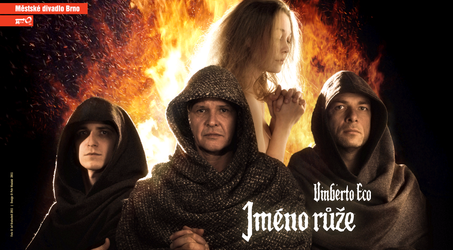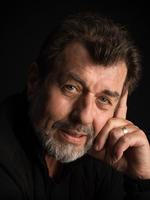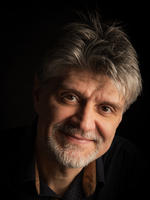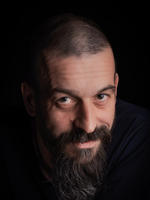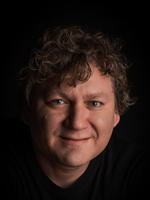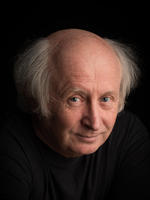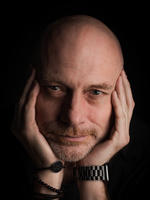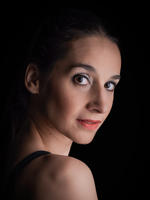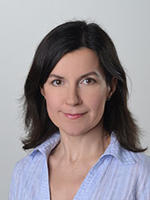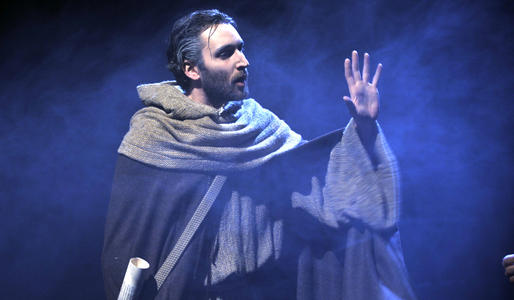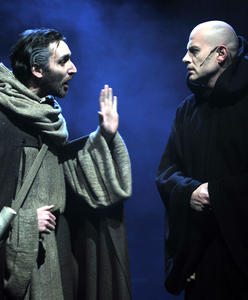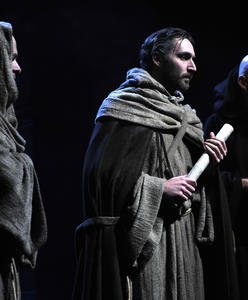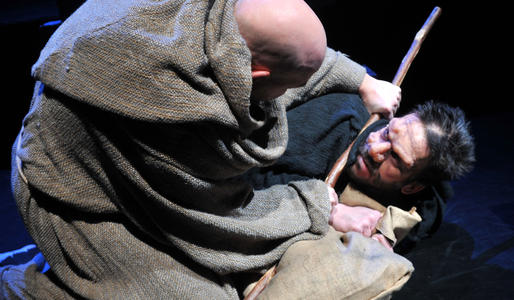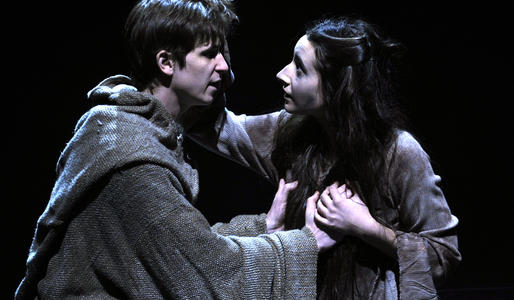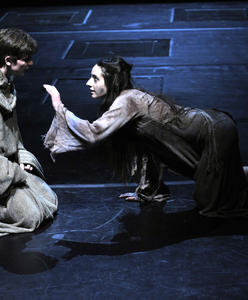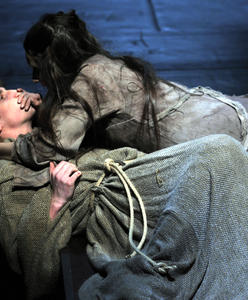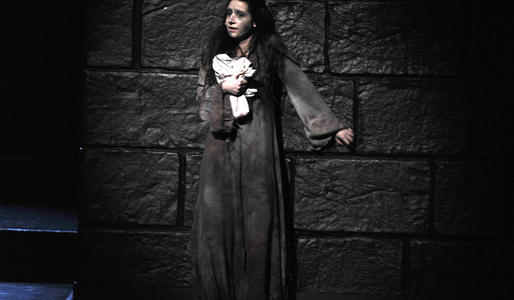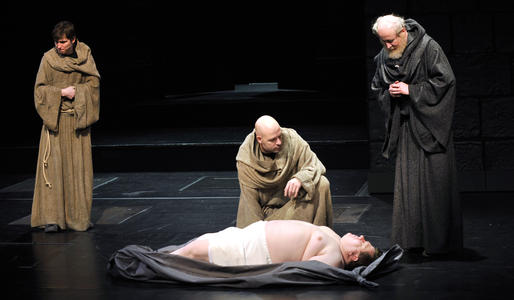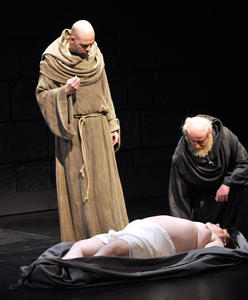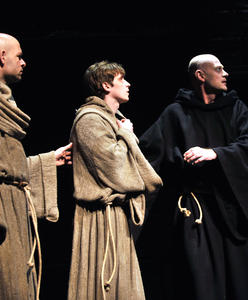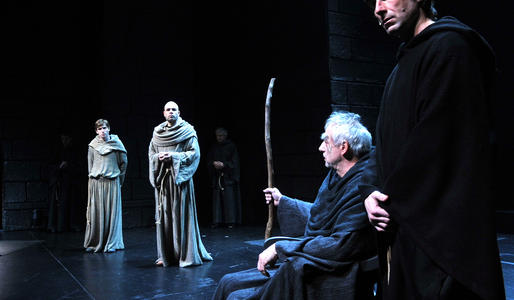Eco´s novel The Name of the Rose in 130 minutes
Markéta Stulírová 25. December 2011 zdroj Brněnský deník
Eco´s novel The Name of the Rose in 130 minutes
The mysterious Gothic thriller The Name of the Rose, directed by Petr Kracik, is a successful stage adaptation of the extensive novel by semiotician Umberto Eco. The novel contains almost 500 pages, while Petr Kracik´s production is 130 minutes long. Despite that, the stage adaptation of the book The Name of the Rose is a fascinating performance which will impress with the elaborate acting performances on show, the emotional music and the stunning set, which uses the most modern theatrical techniques.
Brno City Theatre have produced The Name of the Rose as a Czech premiere directed by Kracik in his fourth directorial role at the theatre – his first title on this stage was Lermontov´s Masquerade, followed by The Gypsies are Going to Heaven and Nana. This time, Kracik strived to achieve only one thing: he didn´t want to copy either the novel or the commercially conceived film version of Eco´s text, but rather to find his own most suitable interpretation of the story, based on the solid work of the actors and within the bounds of Claus J. Frankl’s dramatisation. He was successful – even though he only kept the torso of the Italian semiotician’s original text. Important things are said on stage and an attractive story with a new visual and musical impact awaits the spectators.
Kracik´s stage adaptation respects the basic, fictional storyline concerning William of Baskerville and the young scrivener Adso of Melk, who are trying to solve mysterious murders in a north Italian monastery and unveil the mystery of the largest existing Christian library, which is guarded by blind Jorge of Burgos. Jorge wants to prevent the decay of the old world by the keeping of rare manuscripts in secrecy and considers the second part of Aristotle´s Poetics dealing with the art of comedy as particularly degenerate. According to Jorge, laughter is the work of the devil, as it turns people into fools and leads them astray from true belief. The interventions of director Kracik and dramaturgist Ladislav Stýbl into Frankl´s German version added some other authentic quotations from medieval literature which are absent in Eco´s novel.
Even though Kracik´s production reduces the number of characters and dialogues to a minimum, it reveals the character of some figures to a greater depth (unlike the novel itself). The main role of William of Baskerville is acted by Viktor Skála with noblesse. His learned Franciscan transcends the medieval period both intellectually and with his human attitude, tolerating the misdeeds of his pupil Adso (Vojtěch Blahuta) with understanding. Blahuta in the role of the Benedictine novice is a good-hearted young man. He undergoes all changes in a realistic way: he loves and then loses his love, honours God and forsakes him later, immersed in solitude. Type-wise, the director managed to feature most of the characters (Michal Nevěčný as corpulent Berengar of Arundel, Miloslav Čížek as the botanist Severinus, Jiří Mach as the determined Franciscan Michele de Cesena and Zdeněk Junák as a loyal abbot). Ladislav Kolář (Jorge of Burgos) also demonstrates excellent acting, as well as Rastislav Gajdoš (administrator Remigius) and particularly Erik Pardus and Stano Slovák who alternate in the role of Salvatore. Each of them transform into this ugly helper in their own way, both of them playing with every uttered syllable and grimace with an admirable degree of involvement.
The stage by Jaroslav Milfajt, which makes full use of modern stage technology, brings a mystical atmosphere to the production. The effect of the individual scenes is reinforced by the purposeful “play” of light and shadow, sometimes accompanied by fog and real fire. Simply the use of coloured lighting changes cold into fire, the gloom of the scriptorium into a light-filled courtyard. The three-dimensionality of the set pieces is clear in the simple yet realistically presented library. A dominant feature of the stage is a circular aperture in the highest monastery wall through which stars and moonlight, as well as dream visions experienced by the characters, shine alternately. The periods needed for scene changing are longer but the extra seconds leave space to give the ideas contained in the dialogues the consideration which they deserve. The Name of the Rose is only the second dramatic title shown at the Music Theatre of Brno City Theatre, and it is thus a paradox that one now cannot imagine it at another (smaller) place after seeing it here.
Dalibor Štrunc´s music is in perfect harmony with the artistic concept. The tones of the violins, organ, double bass as well as the dulcimer help the gradation of the plot; emotional melodies blend together with choral singing. As far as the sound effects are concerned, those of a bell chiming, the street bustle during a church service or the squeaking of a pig when it is slaughtered are particularly impressive and never allow the spectators to forget that it is a frosty December in 1327.
Kracik manages to squeeze an extremely difficult subject into an attractive short theatrical version in which – as in Eco´s novel – reality is interlinked with fantasy, joy with cruelty and high art with the “popular” variety.
The eternal conflict between reason and dogmatism
Vít Závodský 12. April 2011 zdroj Týdeník Rozhlas
The eternal conflict between reason and dogmatism
Brno City Theatre set an exceptionally demanding task for itself when it decided, after thorough dramaturgical preparation, to perform the Czech premiere of the stage adaptation of one of the most famous modern novels, the extensive and sophisticated work The Name of the Rose (1980), written by Italian scholar Umberto Eco.
Prague director Petr Kracik could only transfer the main storyline and ideas from this multi-layer “hybrid” work onto the stage of the Music Theatre, using vertical, gloomily monumental scenery elements to create a medieval monastery complete with a scriptorium and labyrinthine library (Jaroslav Milfajt, projections by Petr Hloušek) and with a great score by Dalibor Štrunc. He kept to the basic storyline, with its attractive series of mysterious murders of Benedictine monks investigated by the wise Franciscan William of Baskerville (Viktor Skála) and his novice Adso (Vojtěch Blahuta) in 1327, also keeping some of its historical, theological, apocalyptic and symbolic moments. However, he tried to lay emphasis on the acting of the characters in the monastic community (Ladislav Kolář, Stanislav Slovák, Igor Ondříček, Miloslav Čížek, Martin Havelka). The prevailing verbal disputation alternates with artistically impressive action scenes, while detective investigation intermingles with a tasteful demonstration of passionately natural as well as suppressed eroticism. Kracik´s short but in all aspects high-quality stage production has many intentions to fulfill, bringing up a series of timeless problems which are currently topical: the effort to rediscover Christian order in a morally devastated world, the persistent struggle of ideological dogmatists to permanently ban “heretical” opinions, the collision of a tolerant attitude with blind fanaticism, the relationship between honest belief and pragmatic self-interest. Yet again, a parable which addresses both the mind and the feelings of perceptive theatergoers has been born in Brno.
Eco´s medieval thriller in a Czech theatre premiere
Peter Stoličný 3. April 2011 zdroj www. divadlo.sk
Eco´s medieval thriller in a Czech theatre premiere
Umberto Eco is one of the most important contemporary academic concerned with semiotics (a science concerning signs and communication) and post-modern philosophy in Europe. He’s a professor at Bologna University and an honorary member of many other universities… but he wouldn´t have become a famous and popular celebrity if he didn´t write novels and if his first novel The Name of the Rose, a horror/detective story from the Middle Ages, hadn’t become one of the most widely-read works of the 20th century.
The professor is a real Renaissance man. He devotes equal amounts of energy to writing witty and biting feuilletons, commenting on the societal life of his native Italy as well as on world civilization, semiotics and occult sciences. He collects various books on cabals, the Freemasons, Taoism, Buddhism and Shintoism, and on the strangest paranormal phenomena which were and still are the subject of white and black magic. It´s not that he believes in all this. On the contrary, he enjoys thinking critically about the causes of deviations in human thought. As a left-wing intellectual, he naturally thinks in a materialistic way and literally hunts for causal relationships in the development of social movements and human thinking. However, he has a certain right to be critical because he is knowledgeable. He is educated. He studies everything he writes about in great depth, and this is perhaps why he can afford the luxury of a critical approach. If one investigates his works closely, one can also finds moments of self-irony and almost a humorous view of the striving of mankind for knowledge which is simply expressed in the Christian Bible: Quo Vadis domini….
As early as in 1959, young Eco wrote one of his seminal research works, The Development of Medieval Aesthetics. The novel The Name of the Rose (1980) was, in fact, a natural continuation of his thought process, and it was a lucky step for Eco. Thanks to the very well and interestingly written novel with a detective-story plot he succeeded in promoting his efforts in the media. The professor emerged from the greyness of the libraries with which social scientists are surrounded to popularize a dark period of our civilization, the Christian Middle Ages in Europe.
If I were a purist follower of Christian ideology, the novel The Name of the Rose would irritate me a great deal. It basically reveals something which is characteristic of human civilization but is avoided as a topic of conversation. Power struggles, human greed, religious blindness leading to absurd conclusions. Doing evil in the name of good. There was a joke in the socialist era: We will fight for peace even if all of us have to die! This is what came to my mind when I was reading the novel The Name of the Rose. Fanaticism has shown many times how terrible human deeds can be, and how humanity cannot learn from its mistakes.
Umberto Eco is – I believe unintentionally, because he is interested in the substance of matters, not superficial purposefulness – a sarcastic critic of the Catholic Church. There is definitely nothing noble in this medieval struggle in the period when the Pope had his seat in Rome and a second counterpart Pope in Avignon (14th century). As the clerical fathers haven´t published a single tractate or encyclical dealing with the dark Middle Ages full of murderous inquisition, torture, burning at the stake etc. in a critical way, the ‘Antichrist’ Umberto Eco said it for them. In fact, he said it in such a confident, believable way that he made many Christians doubt whether God knows what he is doing when he leads his sheep to the recognition of the only truth. Even the promoters of Marxism-Leninism didn´t find a better-quality ideological diversion than Christianity. Philosopher Eco approached this in a different way to that of the superficial promoters of atheism. He investigated and collected facts, made comparisons and evaluated them objectively; he simply did his scientific work. And why was the result a merciless criticism of medieval Christianity? Well, because this is what society was like at that time. The ideologists of Christianity still haven´t managed to come to terms with it, but this is already a different issue. Umberto Eco doesn´t point this out - he doesn´t need to. Every intelligent person can make his or her own judgment. Eco doesn´t tell anyone to become an atheist. If it was God´s wish he wouldn´t allow it...
I felt the urge to make such an extensive ‘speech’ so that I can now explain the dramatization of the novel. The formal elements and storyline are maintained. We look into the complex nooks and crannies of politics and the roughness of power struggles. We get to know Aristotle´s book on laughter and the puritan opinions on humour. We will get an insight into the secrets of botany and witness the sensuous sexual desire that is denied to the monks. We will experience the horror of torture and false admission, the fear of pain which is greater than the fear of death. We will witness vain attempts to bring various interpretations of God´s intentions closer together, and the antagonism of fanatic monks which can result in the plotting of murders. This is all contained in the dramatization as well as in the excellent film of the same name directed by Jean-Jacques Annaud with Sean Connery in the main role of the Benedictine investigator of murders in a monastery. However, both in the film and in the theatrical dramatization by Claus J. Frankl (adapted by Ladislav Stýblo for Brno City Theatre), many of Eco´s ideas were left incomplete. There is simply not enough room for all or nearly everything to be said at the theatre. To be honest, I once heard a dramatization of The Name of the Rose on Czech Radio (2002). I looked it up recently on Google. The author of the dramatization was Michal Lázňovský and the director was Ivan Chrs – it was definitely the best adaptation of the novel, featuring details which are missing from other dramatizations. However, this is perhaps a phenomenon of a sound-only recording – focusing on the spoken word leaves greater space for thought. The result of my empathy with The Name of the Rose is that I will certainly come back to the novel after many years to seek thoughts which I missed in the dramatizations. As this production at Brno City Theatre also made an impact on other spectators, it definitely fulfilled its purpose.
Let´s have a look at the production itself, which had its premiere at the large Music Theatre in Brno not a long time ago. The experienced scenographer Jaroslav Milfajt used the whole area of the stage to build a truly impressive dark monastery with a few simple reconstructions which make use of the perfect technical facilities of the Music Theatre. The habits of the medieval monks by Andrea Kučerová were appropriate to the set, and the lights and music supported the whole atmosphere (composer Dalibor Štrunc, music direction Karel Cón and Miloš Makovský – by the way, the medieval male choirs were particularly impressive.)
The atmosphere of a fourteenth-century monastery created by the director of the production, Petr Kracík, is highly believable. It is perhaps even more impressive than that found in the film version. The theatre is live, celluloid is celluloid. He has also led the actors to a deep understanding of the characters – one comment comes to my mind here: Stanislavski would be happy. The credible acting was the main attribute the director worked with and he could afford non-stylized and emotive acting leadership because the ensemble of Brno City Theatre is definitely ready for this task. This is true of the Benedictine investigator William of Baskerville, played by Viktor Skála, as well as his novice, Adso, played by Vojtěch Blahuta (he performed a beautiful scene filled with physical desire with Andrea Březinová – who alternated with Hana Kovaříková). Other actors – the men from a Franciscan monastery, as well as the visiting Benedictines – also played their parts excellently. Zdeněk Junák´s abbot, Martin Havelka’s papal envoy, Rastislav Gajdoš’s monastery administrator and crazy Salvatore, whom Stano Slovák (also an assistant in the direction of the whole production) played with great enjoyment.
It can be said that the production of The Name of the Rose at Brno City Theatre will become one of their series of successful titles that both fill the coffers and simultaneously leave a feeling of discomfort in the spectators. I don´t know how this production will be accepted by actively religious people – it will perhaps cause even greater discomfort in them than in those who have a lukewarm approach to religion. However, it will definitely evoke an anagnorisis in all, an Aristotle-like purgation through knowledge. And this, I think, is the aim of this story from the dark Middle Ages.
Wisdom can no longer prevent the coming of the antichrist
Jiří P. Kříž 23. February 2011 zdroj Právo
Wisdom can no longer prevent the coming of the antichrist
Petr Kracik has brought the Name of the Rose onto the stage of Brno City Theatre in noble and cultivated “high style”, with a translation by Václav Cejpek and Monika Kučerová. A decisive element is the music by Dalibor Štrunc, which ranges from male church choirs to freer rhythmic compositions supported by saxophones, bassoons, organ as well as dulcimer.
The large stage of Brno’s Music Theatre enabled the scenographer Jaroslav Milfajt to create the perfect illusion of a monumental monastery with dark corridors and a labyrinthine library from the realms of fantasy, showing clear parallels with the elements of a gothic novel. Visions of dragons, angelic apparitions and a burning stake were created by scenic projection wizard Petr Hloušek.
The austerity of the monks as well as the provocatively torn dress of the only female character, the womb of vice, the abused Girl (Hana Kovaříková or Andrea Březinová), are the work of Andrea Kučerová. Kracik had the task of creating a production which would fill the large hall of the Music Theatre. With the exception of the inimitable Sean Connery in the role of the “detective”, Baskerville, whose character, laden with contemplative knowledge of the evil practices of the Church, is played in Brno by Viktor Skála, the director tried to make the characters as close to those in Annaud’s film as possible.
Also knowledge can be misused
We can find most similarities in the case of the novice Adso, William’s pupil (Vojtěch Blahuta), of the guardian of dogma and crazy dignity, Jorge of Burgos (Ladislav Kolář), and of the librarian’s helper, Berengar (Michal Nevěčný). The best performances: Stano Slovák and Erik Pardus in the character of the degenerate creature, the heretic Salvatore. They have a great spectacle for the audience in Brno. Despite the accentuation of the murder mystery side of the plot, The Name of the Rose is still a parable about the misuse of knowledge and power.
The Name of the Rose – the Czech theatre premiere of a mysterious drama and detective story
Kateřina Šebelová 23. February 2011 zdroj Velká Epocha
The Name of the Rose – the Czech theatre premiere of a mysterious drama and detective story
"Lovers of a good story, thrills and mysteries will certainly enjoy themselves, and that’s what matters"
The creators of the theatre version of The Name of the Rose didn’t aim to compete with the original novel or film version, though the authors aren’t trying to avoid comparisons of the play with the book or the film at all. However, you won’t be able to find some of the scenes known from the book or film in the production, as the aim was not to stick to the novel strictly but rather to pinpoint areas that don’t stand out quite so much in the film or the novel, and this was very successful. The mysterious torch-lit atmosphere, tension within the confines of the monastery walls, scary scenery elements, chorals sung by the monks augmented by excellent music by Dalibor Štrunc which reinforces the claustrophobic atmosphere – all this in combination with excellent acting performances accompanies the thrilling story up to the very end. The emotive power of the male cast depicts very well the desire for power and blind belief which can sometimes elate but also hold back. The strict order which suppresses spontaneity at any cost contains flaws which stir up the still waters of monastery life. The muddle of relationships, desires and emotions which both normal people and monks cannot avoid is slowly disentangled. William of Baskerville manages, thanks to his wisdom and courage, to defy the church authority as well as his own fears and demons.
The actors don’t hold back
The role of William of Baskerville was played by Viktor Skála, whose performance is excellent. Mature acting with no lack of style and experience emerges from underneath the monk’s hood. His companion, the young novice Adso (Vojtěch Blahuta), brings a youthful and natural performance; he is perhaps somewhat over-naïve, but this isn’t such a problem in this role of a young novice. One’s interest is also drawn by Stanislav Slovák in the role of the mutilated and crazy Salvatore, and by the only distinct women in this purely male production, Hana Kovaříkova, whose character is both muse and fallen woman in one. The apocalyptically frightening Ladislav Kolář in the role of Jorge of Burgos makes use of plentiful emotions in his role, and Jaroslav Matějka as the librarian Malachi is mysterious enough up until his on-stage death. The actors simply did a great job, with none of them holding back in their performances.
It requires a great deal of courage and skill to produce such a difficult work as The Name of the Rose, one of the best contemporary novels. Petr Kracik approached his task with the necessary nobility, and one can do nothing but applaud his deed sincerely. Brno City Theatre’s Name of the Rose offers a thrilling story from beginning to end. It definitely doesn’t bore; the only empty pauses are the times when the scenery is being changed. However, Štrunc’s great music manages to minimize the effect of this “evil”. The Name of the Rose makes the spectators think about the meaning of human existence. Lovers of good stories, thrills and mysteries will certainly enjoy themselves, and that’s what matters.
The Name of the Rose: a theatrical version at Brno City Theatre
Karla Hofmannová 1. December -1 zdroj www.zivotnistyl.cz
The Name of the Rose: a theatrical version at Brno City Theatre
The theatrical adaptation by Claus J. Frankl takes only the essential and dramatic from the extensive source material, doesn´t overload the plot with unnecessary convolutions and brings only important characters onto the stage. It frees the plot from getting too much involved in history and moralizing, with the dispute between the Benedictines and Franciscans included as a logical part of the plot.
Director Petr Kracik was limited by the heavy stage set by Jaroslav Milfajt. The author of the set very cleverly enabled, via rotation, the gloomy walls of the monastery to be transformed into the labyrinth of the library, and Petr Hloušek provided the effects of visual deformations and flames using projections. The acting of the monks is always limited to the same, not very large area with strictly determined entrances and exits. Despite this, the plot develops swiftly and builds nicely. Dalibor Štrunc´s recordings are inspired by liturgical chorals and sometimes evoke a frightening atmosphere. The acoustic setup of the Music Theatre is not intended for non-acoustic words and therefore the actors couldn´t avoid using microports. The scene where the Girl and Adso make love is magical, yet natural and tasteful.
The actors played their parts excellently. Viktor Skála´s performance in the role of William of Baskerville is sober and in accordance with the soul of a scientist, and yet strong in character. Young Vojtěch Blahuta in the role of Adso of Melk is touching, dynamic and confident. Stano Slovák in the role of Salvatore is an absolute star; he admirably remains in-role with naturalistic acting that carries an energetic charge. Ladislav Kolář as Jorge of Burgos is hard in his fanaticism, Martin Havelka as Bernard Gui is sly and superior, and the botanist, Severin, acted by Miroslav Čížek doesn´t lack humor even in his tragedy. Also, Igor Ondříček as Ubertin of Casale was engaging with his tragic honesty and bitterness, as was Zdeněk Junák as Abbo, the abbot of the monastery who is trying to keep up the appearance of order at any cost.
The play The Name of the Rose is a moving and dramatic Gothic thriller in which every spectator will find something interesting and captivating and which awakens in us an interest in history and the fight of mankind for its existence.

